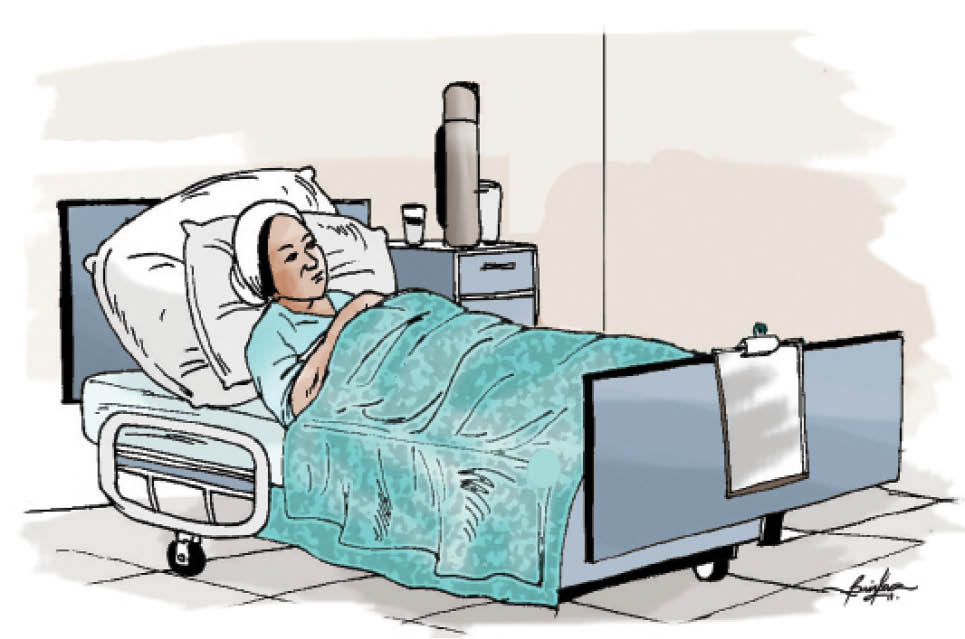Ramla is a petite 14-year-old wife of a peasant farmer at Sabon Birni Local Government Area of Sokoto State. When she was in labour during her first pregnancy, she was told to continue drinking only hot water at home. Ramla was in pains for about three days in the house.
However, after much persuasion, her husband took her to the hospital. She underwent surgery but the baby was found dead. She began to experience uncontrollable passing of urine after that and was diagnosed of obstetric fistula also known as Vesicovaginal Fistula (VVF).
Ramla’s husband subsequently deserted her. The teenager who had lost her father, had only her mother to stand by her. She is one of the several Vesicovaginal Fistula (VVF) patients in Sokoto State; many of whom are often rejected by their husbands, families, communities and friends and treated as outcasts.
Many of them find it difficult sustaining themselves because they were dependent on their spouses and lack alternative means of livelihood.
According to the World Health Organisation (WHO) obstetric fistula is ‘an abnormal opening between a woman’s genital tract and her urinary tract or rectum’. WHO said the development of obstetric fistula is directly linked to obstructed labour which is one of the major causes of maternal mortality.
Consultant Gynaecologist, Usmanu Danfodiyo University Teaching Hospital, Sokoto, Dr Mairo Hassan, notes that Vesicovaginal Fistula (VVF) is still a major public health problem in developing countries, adding that in Nigeria, prolonged obstructed labour accounts for majority of the cases.
She, however, points out that the prevalence is often underestimated because the number of sufferers is linked to those who go to the hospital for treatment while there are many patients with the condition whom, she notes, suffer in silence and isolation.
The gynaecologist observed that poor women get fistula partly because of their inability to promptly access obstetric services. She also identified lack of decision making power for women even on issues pertaining to their health as one of the social contributors to the condition.
Dr Mairo said there is need to put in place strategies that involve husbands and their relatives and that women need to be empowered with knowledge and economically.
The medical expert said it is important for trained counsellors to provide appropriate information and education to Vesicovaginal Fistula (VVF) patients, their spouses, and relatives. She said this would help patients and their relatives make informed and responsible choices during subsequent pregnancies, and that it could also lead to increased acceptance of hospital deliveries.
The consultant dismissed the allusion that Vesicovaginal Fistula (VVF) is caused by interventions or procedures to relieve obstruction at hospital.
She added that there are risks associated with subsequent vagina deliveries for a Vesicovaginal Fistula (VVF) patient and difficulty in repairing cases of recurrence.
“Some people think labour cause fistula. No labour does not cause fistula, if labour causes fistula, every woman will have it,” said Dr. Bello Lawal, Chief Medical Director of Maryam Abacha Women and Children Hospital, Sokoto.
Dr Lawal explains that it is obstructed labour – that is labour that lasts for several hours or days – that causes fistula.
“If a woman is in labour and she has intervention in a few hours, she will not have fistula,” he said, adding, “that is why we are agitating that no woman should be allowed to deliver at home, she should be brought to a professional so that she can get relief.”
According to him, one of the greatest challenges is the issue of enlightenment. “There is the issue of communities coming to terms to with Vesicovaginal Fistula (VVF). Because of stigmatization, the women were not coming out for treatment.”
He said Vesicovaginal Fistula (VVF) is a curable disease especially when the patient seeks medical attention early.
Dr Lawal said Maryam Abacha Women and Children Hospital, Sokoto which offers free VVF interventions, treated 227 VVF patients last year, out of which, 200 underwent specialised surgeries.
“Hopefully in 2019, we will be able to do more than 200, 200-250 or more,” he said, adding that the hospital gets monthly financial subvention from the state government, and that it has had its theatre upgraded.
The medical practitioner added that the hospital offers routine fistula surgeries weekly – on Wednesdays and Thursdays – and that some organisations periodically sponsor treatment of patients.
“Usually, we get support from different organisations especially from abroad. The support we get from the non-governmental organsiation depends on the number that they can sponsor, sometimes we do 30 or 40 depending on the supporting organisation.
“We have backlog because the issue of VVF can be complex. We have categories of operation based on the extent of their injury, some with simple or intermediate or less complicated, some may have extensive destruction of the bladder and if you have extensive destruction of bladder, it is a complicated issue and need the highly skilled approach.”
After treatment, patients are referred to the vocation training centre located within the hospital before integrating them back into their respective communities, the medical director added.

 Join Daily Trust WhatsApp Community For Quick Access To News and Happenings Around You.
Join Daily Trust WhatsApp Community For Quick Access To News and Happenings Around You.


